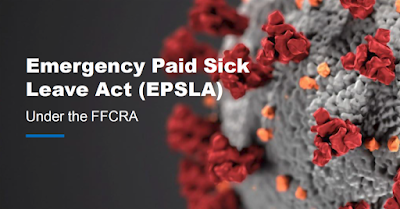In Toro v. ACME BARRICADES, LC, Dist. Court, (MD Florida 2021), the court laid out the statutory scheme as follows:
Under the FCCRA, the EPSLA provides, in relevant part, as follows:
(1) An Employer shall provide to each of its Employees Paid Sick Leave to the extent that Employee is unable to work due to any of the following reasons:
(i) The Employee is subject to a Federal, State, or local quarantine or isolation order related to COVID-19;
(ii) The Employee has been advised by a health care provider to self-quarantine due to concerns related to COVID-19;
(iii) The Employee is experiencing symptoms of COVID-19 and seeking medical diagnosis from a health care provider;
(iv) The Employee is caring for an individual who is subject to an order as described in this paragraph (a)(1)(i) or directed as described in this paragraph (a)(1)(ii);
(v) The Employee is caring for his or her Son or Daughter whose School or Place of Care has been closed for a period of time, whether by order of a State or local official or authority or at the decision of the individual School or Place of Care, or the Child Care Provider of such Son or Daughter is unavailable, for reasons related to COVID-19; or
(vi) The Employee has a substantially similar condition as specified by the Secretary of Health and Human Services, in consultation with the Secretary of the Treasury and the Secretary of Labor. . . .
29 C.F.R. § 826.20(a)(1). As it relates to advice of a health care provider to self-quarantine, the FFCRA provides that: "[a]n Employee may take Paid Sick Leave for the reason described in paragraph (a)(1)(ii) of this section only if:
(i) A health care provider advises the Employee to self-quarantine based on a belief that:
(A) The Employee has COVID-19;
(B) The Employee may have COVID-19; or
(C) The Employee is particularly vulnerable to COVID-19; and
(ii) Following the advice of a health care provider to self-quarantine prevents the Employee from being able to work, either at the Employee's normal workplace or by Telework. An Employee who is advised to self-quarantine by a health care provider may not take Paid Sick Leave where the Employer does not have work for the Employee.
Id. § 826.20(a)(3). Under the EPSLA, a qualifying full-time employee is entitled to up to eighty (80) hours of paid sick leave. Id. § 826.21(a)(1).
The EPSLA further provides that
An Employer is prohibited from discharging, disciplining, or discriminating against any Employee because such Employee took Paid Sick Leave under the EPSLA. Likewise, an Employer is prohibited from discharging, disciplining, or discriminating against any Employee because such Employee has filed any complaint or instituted or caused to be instituted any proceeding, including an enforcement proceeding, under or related to the EPSLA, or has testified or is about to testify in any such proceeding.
Id. § 826.150(a); see also Kofler v. Sayde Steeves Cleaning Serv., Inc., No. 8:20-cv-1460-T-33AEP, 2020 WL 5016902, at *2 (M.D. Fla. Aug. 25, 2020) ("Although the FLSA and FFCRA are different statutes, retaliation for asserting rights under the FFCRA violates the FLSA.").
Participating in a complaint process is protected from retaliation under all circumstances. Other acts to oppose discrimination are protected as long as the employee was acting on a reasonable belief that something in the workplace may violate EEO laws, even if he or she did not use legal terminology to describe it.
Covid Case of The Week - Wage and Hour Claims Added to Retaliation Claim - Aguayo v. Shield N Seal (Posted April 3, 2021)
Covid Case of the Week - Kofler v. Sayde Steeves Cleaning Service, Inc. - Termination of Employee Seeking FFCRA Leave a Violation of Anti-Retaliation Provisions of FLSA (Posted April 9, 2021)
The 16 States (Plus D.C.) That Have Mandatory Paid Sick Leave Policies
Here Are Some Major Cities That Have
Mandatory Paid Sick Leave Laws for Employees of Private Employers
WHAT 34 STATES DO NOT HAVE ANY PAID SICK LEAVE LAWS FOR PRIVATE EMPLOYERS?
The Minimum Wage Rate in Each State - States With Highest and Lowest Minimum Wage Rates




